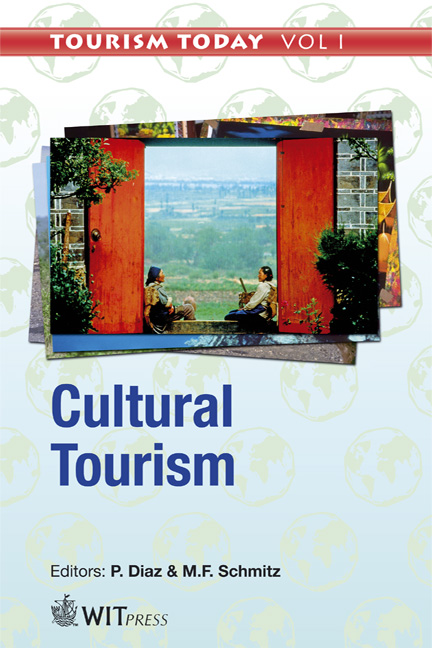Cultural Tourism
Edited By: P. Diaz, Universidad de La Laguna and Universidad Pablo de Olavide, Sevilla, Spain and M.F. Schmitz, Universidad Complutense de Madrid, Spain
Price
£78.00 (free shipping)
ISBN
978-1-84564-806-0
eISBN
978-1-84564-807-7
Pages
152
Book Series Title
Tourism Today
Book Series
1
Transaction Series
WIT Transactions on State-of-the-art in Science and Engineering
Transaction Volume
68
Published
2014
Format
Hardback
A key featureof the tourism system is its ability to adapt to new demands while generating others. Tourism’s capacity for renewal is based largely on a balance between competitiveness and opportunity to transform places and objects or even people into socioeconomic resources.
The modern tourist has become more aware of the pitfalls of mass tourism, leading to a growing demand for variety. As a consequence of environmental awareness, tourism has been shown to be one of the economic activities that contribute most to the deterioration of the landscape.
Today a reinterpretation of the negative effects of conventional tourism has emerged, resulting in the gradual appearance of prestigious tourism offers based largely on demand for authentic 'nature' and 'culture' experiences. This type of tourism is often associated with responsibility, participation and sustainability. Tourism planners are aware of this fact and have therefore adapted their products and destinations to new market demands.
All this can affect the identity of the local people and the landscape of the destination; the challenge entails studying ways to preserve the natural and cultural heritage while avoiding the undesirable effects of new forms of tourism.
The selection of papers presented in this book deal with cultural tourism, and comprises case studies and theoretical contributions. The volume addresses issues of cultural tourism management, demand analysis, post-tourism, new forms of tourism, cultural effects on destinations and products of sustainable cultural tourism.




